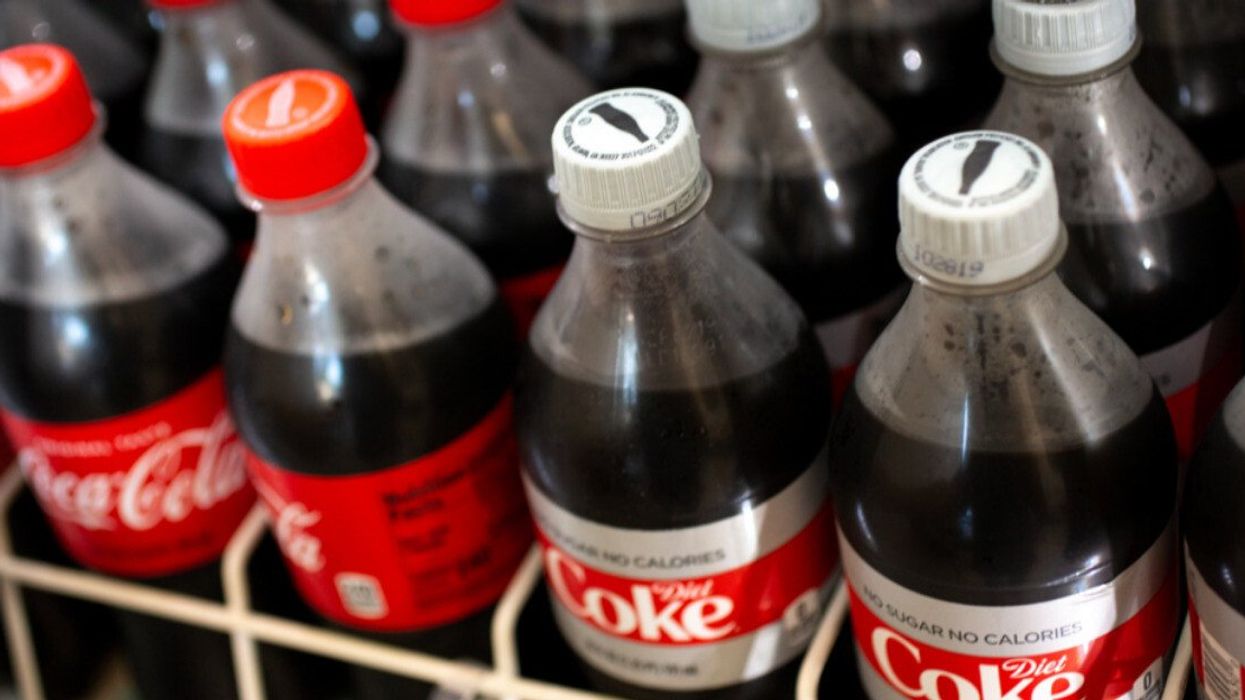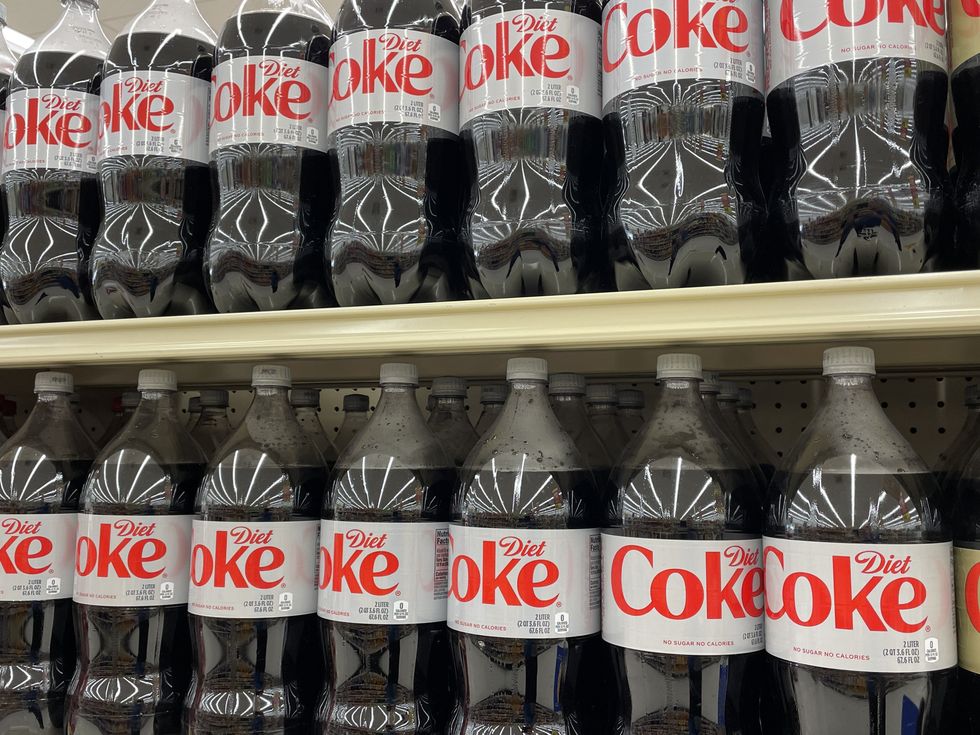Aspartame Sweeteners In Diet Coke Could Be A Cancer Risk & Here's What Canada Recommends
Should you stop drinking diet pop?

Bottles of Coca-Cola and Diet Coke.
Aspartame, one of the most common artificial sweeteners used in items like Diet Coke, will reportedly be declared a possible cancer risk by the World Health Organization.
In June, Reuters reported that sources told the outlet about the WHO declaration set to happen on July 14.
According to the report, aspartame would be listed as "possibly carcinogenic to humans for the first time by the International Agency for Research on Cancer (IARC)," which is part of the WHO.
Aspartame is a low-calorie sweetener commonly found in diet soft drinks, sugar-free gum and some desserts. People use it for a number of reasons, including to lower their sugar intake or to help them lose weight.
While the news is bound to be alarming to many of us who consume artificial sweeteners either daily or on occasion, an expert says there's no need to panic.
"That's the key word, it's possibly carcinogenic, it's not necessarily definitively carcinogenic. I think that's an important distinction for readers to be aware of is that it's a possibility, so not 100%," says Dr. David Ma, a professor in the Department of Human Health and Nutritional Sciences at the University of Guelph.
In his interview with Narcity, the professor compared the possible risk to the one some of us take on daily: driving.
"We accept that it is a potential hazard. But you know, we take precautions, we follow the rules of the road, put on a seatbelt," he said. "So driving is a hazard, but it's low risk because of all those things that we do to protect ourselves."
Ma added that the declaration will most likely say artificial sweeteners are a "low risk" and says there are lots of factors to consider when it comes to artificial sweeteners and the role they have on our health.
What is a carcinogen?
According to the National Institutes of Health (NIH), a carcinogen is "any substance that can cause cancer."
Carcinogens can be naturally occurring, like ultraviolet rays from the sun, or human-generated like cigarette smoke and exhaust fumes from vehicles.
The NIH adds that simply being exposed to carcinogens does not mean a person will get cancer and it depends on a number of factors like the duration and amount of exposure as well as the person's genetic background.
Is aspartame harmful to your health?

Bottles of Diet Coke in a grocery store.
Aspartame has been allowed for use in a number of different food items in Canada since 1981, according to the Government of Canada.
The government adds that before the sweetener is used in foods, Health Canada officials conduct a number of toxicology tests to ensure it's safe for humans to consume. Although the government body does say aspartame is safe for more "healthy individuals," an excessive amount of it can be a health risk for people who suffer from certain health disorders.
As for whether it causes cancer in humans, the American Cancer Society says no studies have shown such a link.
Ma says every artificial sweetener works a bit differently and he doesn't see any issue with consuming it from time to time.
However, he does explain that researchers still have a long way to go to figure out the short and long-term effects of consuming artificial sweeteners like aspartame. He says for that reason he doesn't recommend parents give it to young children.
"If we're thinking about cancer, you know, that's decades down the road. We know now that many of the chronic diseases that we see in adults really begin in the formative years in preschoolers and toddlers even," Ma told Narcity.
What is the recommended daily intake of aspartame?
The safe daily amount of aspartame, as established by Health Canada, is 40 milligrams per kilogram of body weight.
According to Ma, very few people actually consume the maximum amount per day.
The professor explained this in the interview by using an example of a can of diet pop that has about 180 milligrams of aspartame and an average adult who weighs 154 pounds or 70 kilograms.
"The maximum amount that an individual weighing 70 kilograms could consume safely per day is 2,800 milligrams per day," he said.
"Which equates to 15-and-a-half cans of a diet drink containing 180 milligrams, so I don't know of any people who are consuming that many [cans of diet pop]."
Are some artificial sweeteners better than others?

Packets of low-calorie sweetener next to a cup of tea.
Ma says it's still unclear if some artificial sweeteners are better for our health than others.
"Every time we think there's a better alternative, it takes a few years then we discover 'oh we traded one benefit for another potential harm' and it's unknown at the time until we have more evidence to confirm all the benefits and/or potential side effects," he explained.
Should you stop drinking diet pop?
One thing experts seem to agree on is that the pending declaration by the WHO is not a means for panic and there's no need to stop drinking diet pop altogether.
In an interview with TODAY.com, Jen Messer, a registered dietitian at Jen Messer Nutrition, says some people benefit from drinking diet drinks.
“Replacing sugary beverages with low- or no-calorie drinks can be beneficial for overall health,” she told TODAY.com.
“They can also be a helpful way for individuals to transition from a high intake of sugar-sweetened sodas to more healthy alternatives."
Ma says the general takeaway from the Reuters report is that this health news is something to be "mindful" of when it comes to our health. However, he says consuming small amounts of artificial sweetener is "perfectly fine."
"If you're consuming a high level [...] in excess of 10 cans of diet drink [a day], for example, that would be reaching the upper tolerable limit of safety," he added.
The University of Guelph professor also explains that people often look for "superfoods" that will promote our health and prevent disease as well as nutrients and additives that may be negatively impacting our health. However, he notes there's more to it than that.
"We should really be thinking about the totality of our diet, everything that we're consuming," he expressed.
"There's no magic bullet or specific item that will harm us if we consume a trace amount, but rather we should be thinking about eating whole foods as often as possible, preparing meals from scratch, so that we thrive from actual benefits from the foods that we consume, rather than ultra-processed foods that we have readily available."
This article's cover image was used for illustrative purposes only.
This interview has been condensed and edited for clarity.
- Ultra-Processed Fast Food & Dementia Were Linked In A New Study & Here's What You Should Know ›
- UV Dryers At Nail Salons May Be Linked To Cancer Risk & Here's What Doctors Recommend ›
- I Was Diagnosed With Skin Cancer & Here's The Expert Advice I Wish I'd Known Sooner ›
- Air Quality In This Ontario City Is Comparable To Smoking 1 Cigarette A Week, Says Study - Narcity ›